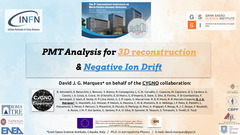PMT analysis for Negative Ion Drift and 3D reconstruction
ID:24
Submission ID:24 View Protection:ATTENDEE
Updated Time:2024-10-09 13:45:07
Hits:763
Oral Presentation
Abstract
CYGNO/INITIUM is a directional TPC detector for low energy rare event searches with the purpose of detecting low mass (0.5-50 GeV/c2) WIMPs and performing solar neutrino spectroscopy. This project establishes itself by its strong directionality capabilities, the use of gaseous He:CF4 at atmospheric pressure, and optical readout.
In CYGNO detectors, the amplification is achieved by a stack of three GEMs that amplify the primary charge and, consequently, produce light due to the scintillating properties of the gas. The readout of our detectors is carried out through the combined use of a sCMOS camera and PMTs. The high sensitivity of these sensors renders possible the 3D reconstruction of ionizing events and the measurement of the energy, direction and head-to-tail asymmetry of particles.
Complementary, the goal of INITIUM is to test and characterize the introduction of SF6 in the CYGNO gas mixture. SF6 leads to the creation of negative ions at the primary ionization stage. The ion drift, when compared to electrons, strongly suppresses diffusion, allowing for much better spatial resolutions.
In this presentation, we will present the PMT analysis of real data taken in the context of the CYGNO/INITIUM experiment. On one side, we will discuss the longitudinal diffusion measurements obtained through the analysis of PMT waveforms in negative ion drift (NID) mode. The results were cross-analysed with the transverse diffusion measurements obtained with the sCMOS sensor, and also compared with literature. On the other side, we will discuss the CYGNO's results on 3D track reconstruction capability achieved by merging the light time profile (dZ) obtained with the PMT signals with the 2D (X-Y) projection of the sCMOS camera. When merged with the direction and 3D head-to-tail capabilities of CYGNO, this is expected to allow CYGNO to reduce backgrounds coming from known sources and to improve particle identification.
David J. G. Marques on behalf of the CYGNO collaboration
Keywords
PMT,Negative ions,3D reconstruction,GEMs,TPC
Submission Author
David Marques
Gran Sasso Science Institute




Comment submit